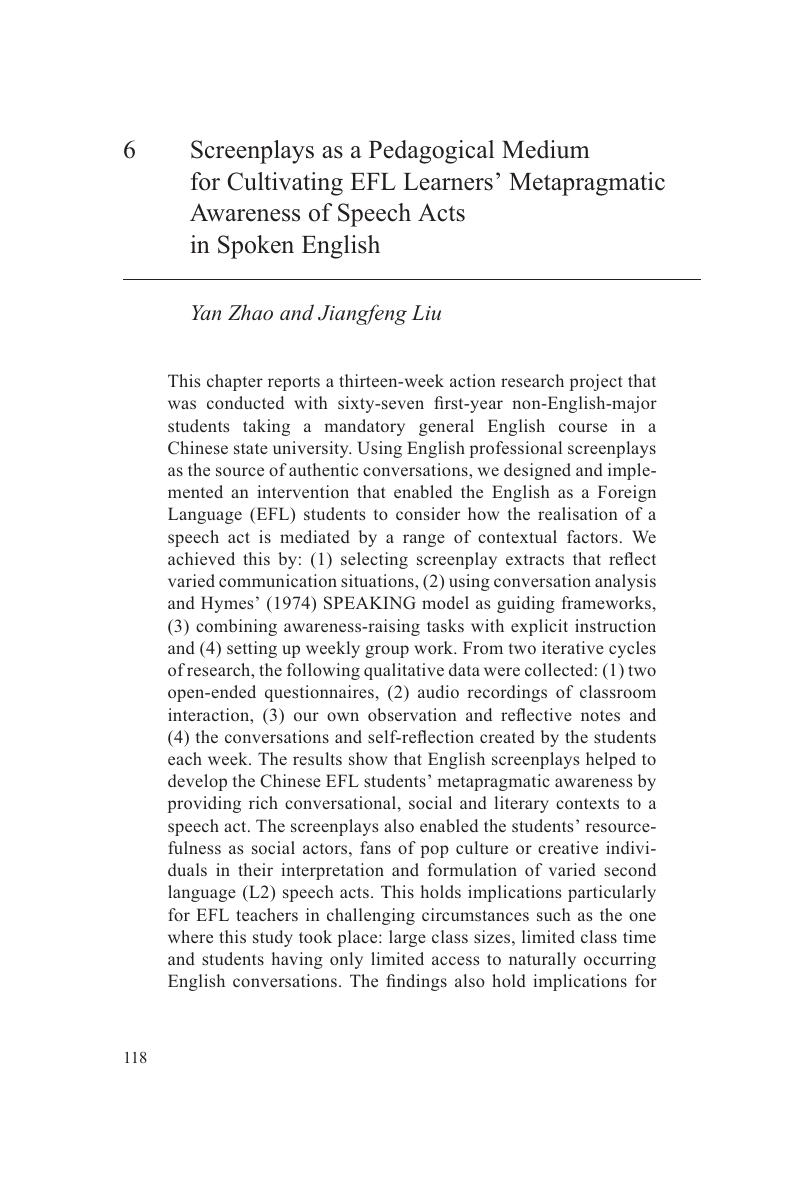Book contents
- Literature, Spoken Language and Speaking Skills in Second Language Learning
- Literature, Spoken Language and Speaking Skills in Second Language Learning
- Copyright page
- Contents
- Figures and Tables
- Contributors
- Foreword
- Acknowledgements
- 1 Introduction
- Part I Literature and Spoken Language
- 2 The Realism of Conversation in Literature
- 3 Using Literature in Text-Driven Materials to Help Develop Spoken Language Awareness
- 4 Literature, TV Drama and Spoken Language Awareness
- 5 Haiku and Spoken Language: Corpus-Driven Analyses of Linguistic Features in English Language Haiku Writing
- 6 Screenplays as a Pedagogical Medium for Cultivating EFL Learners’ Metapragmatic Awareness of Speech Acts in Spoken English
- Introduction
- Previous Research
- Methodology
- The Intervention
- Study Design and Teaching Methodology
- Results and Discussion
- Invoking Sociocultural Knowledge to Facilitate Sociopragmatic Analysis
- Building a Creative Space Where Students Made Meaningful Sociopragmatic and Pragmalinguistic Designs
- Providing a Literary Medium through Which Examination of Pragmalinguistic Features is Stimulated by Discussions of Subtext and Characterisation
- Discussion
- Conclusion
- Acknowledgement
- Appendix 6A The Two Open-Ended Questionnaires Respectively Administered in Week Six and Week Thirteen
- Appendix 6B The Week-by-Week Syllabi in Cycle One and Cycle Two
- Appendix 6C An Outline of the Pre-class Handout Distributed in Week Twelve
- Appendix 6D A Summary of the Ten Weekly Homework Prompts
- Part II Literature and Speaking Skills
- Index
Appendix 6A - The Two Open-Ended Questionnaires Respectively Administered in Week Six and Week Thirteen
from 6 - Screenplays as a Pedagogical Medium for Cultivating EFL Learners’ Metapragmatic Awareness of Speech Acts in Spoken English
Published online by Cambridge University Press: 18 October 2019
- Literature, Spoken Language and Speaking Skills in Second Language Learning
- Literature, Spoken Language and Speaking Skills in Second Language Learning
- Copyright page
- Contents
- Figures and Tables
- Contributors
- Foreword
- Acknowledgements
- 1 Introduction
- Part I Literature and Spoken Language
- 2 The Realism of Conversation in Literature
- 3 Using Literature in Text-Driven Materials to Help Develop Spoken Language Awareness
- 4 Literature, TV Drama and Spoken Language Awareness
- 5 Haiku and Spoken Language: Corpus-Driven Analyses of Linguistic Features in English Language Haiku Writing
- 6 Screenplays as a Pedagogical Medium for Cultivating EFL Learners’ Metapragmatic Awareness of Speech Acts in Spoken English
- Introduction
- Previous Research
- Methodology
- The Intervention
- Study Design and Teaching Methodology
- Results and Discussion
- Invoking Sociocultural Knowledge to Facilitate Sociopragmatic Analysis
- Building a Creative Space Where Students Made Meaningful Sociopragmatic and Pragmalinguistic Designs
- Providing a Literary Medium through Which Examination of Pragmalinguistic Features is Stimulated by Discussions of Subtext and Characterisation
- Discussion
- Conclusion
- Acknowledgement
- Appendix 6A The Two Open-Ended Questionnaires Respectively Administered in Week Six and Week Thirteen
- Appendix 6B The Week-by-Week Syllabi in Cycle One and Cycle Two
- Appendix 6C An Outline of the Pre-class Handout Distributed in Week Twelve
- Appendix 6D A Summary of the Ten Weekly Homework Prompts
- Part II Literature and Speaking Skills
- Index
Summary

- Type
- Chapter
- Information
- Publisher: Cambridge University PressPrint publication year: 2019

